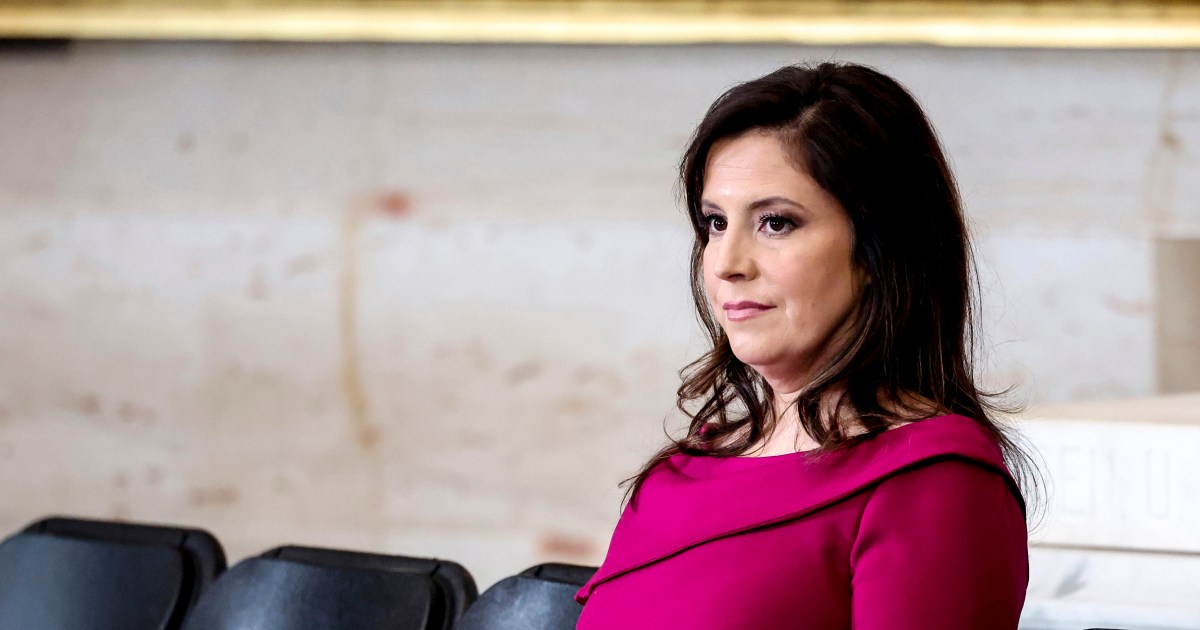WASHINGTON — When President Donald Trump withdrew Rep. Elise Stefanik’s nomination to be U.S.
ambassador to the United Nations, she was given private assurances that she would not only rejoin the House GOP leadership team, but also reclaim her coveted spot on the House Intelligence Committee, according to two Republican sources with knowledge of the deliberations. Two weeks later, Speaker Mike Johnson is still scrambling to figure out how to deliver on that promise to place her back on the committee, even after the move was announced publicly on Wednesday. The conundrum for Johnson is that he either has to remove a Republican that currently sits on the high-profile Intelligence Committee, which could cause strife among existing members, or be forced to change the House rules to add a member.

House rules dictate that the committee may be made up of no more than 25 members with a maximum of 14 from one party, which is how many Republicans currently serve on the panel. Adding a member would increase the size of the committee that some members have already complained is too bloated. It could also force Johnson to allow House Minority Leader Hakeem Jeffries, D-N.
Y., to add another Democrat as well. In a statement to NBC News, Johnson’s office said the speaker and House Intelligence Committee Chairman Rick Crawford are committed to finding a solution to accommodate Stefanik in the coming weeks.
“The Speaker will be working with Chairman Crawford and HPSCI members to get Rep. Stefanik reintegrated into the Intelligence Committee in the coming weeks,” a spokesman for Johnson said. “They both look forward to having her expertise back on the committee.
” Stefanik’s office did not respond to a request for comment. The awkward situation has created tensions between Johnson and Stefanik, on the influential panel, and within the broader GOP conference. Adding to the drama, three senior House Republicans say Stefanik strong-armed Johnson into publicly announcing her new leadership arrangement ahead of a key budget vote in the House where her support was sorely needed.
At this point, Johnson has yet to signal his intentions to the Intelligence Committee members, leaving several worried if their spot could be on the chopping block. In private conversations hashing out Stefanik’s new arrangement, a source familiar with the discussion said the speaker floated several Republicans whom he could potentially ask to step down. That includes Rep.
Pat Fallon of Texas, who is the most junior Republican on the panel; Rep. Claudia Tenney, who like Stefanik is from New York; and Rep. French Hill of Arkansas, who now chairs the powerful House Financial Services Committee.
Johnson appointed Fallon and Tenney to the panel on Jan. 16. But despite Johnson’s initial suggestions, no decisions have been made and no members have been approached about whether they’d be willing to forfeit their spots, according to multiple GOP sources.
“I think it’s a fluid process,” said one House Republican who is familiar with the discussions on the panel. “I think they’re trying to see if they bump somebody off to make room for her, or whether they add two more — add a Democrat and a Republican.” The lawmaker said they opposed adding more members because the Intelligence Committee had already been “expanded twice in the last two years.
” Johnson needs to tread carefully, as his past picks for the House Intelligence Committee, which provides oversight of the Office of the Director of National Intelligence and the Central Intelligence Agency, have landed him in hot water with some corners of the conference. The speaker upset moderates last Congress when he passed over more pragmatic members, like Reps. Stephanie Bice, Zach Nunn and Rep.
Laurel Lee, and instead named two controversial firebrands to the panel, Reps. Scott Perry and Ronny Jackson. And earlier this year, Johnson booted the panel’s former chairman, Rep, Mike Turner, who was not well liked in Trump’s orbit.
Stefanik's role collides with key budget vote The consternation over how to accommodate Stefanik on is just one example of the disruption Trump caused by pulling her nomination . And it’s a situation that Stefanik may be using to her advantage, asserting her close relationship with Trump and the fact her vote is crucial for Republicans in the narrowly divided House. On Wednesday, House leaders were preparing to take a procedural step toward adopting a budget resolution to advance Trump’s legislative agenda.
At that point, Johnson had yet to announce Stefanik’s new role, even though there were behind-the-scenes talks. Stefanik, who had not voted in the House since Trump withdrew her nomination on March 27, made the White House aware of the situation as officials were calling to whip budget votes, according to two sources familiar with the situation. Amid pressure from Stefanik, Johnson decided to greenlight a public announcement about the congresswoman’s new arrangement, the sources said.
Stefanik then showed up to the Capitol for the key procedural vote, but she withheld her vote until the very last second, making her decisive in putting the measure over the finish line. Whether intentional or not, the maneuver served as an unmistakable reminder to Stefanik’s colleagues that they need her vote, which is why Trump asked her to stay in Congress. Moments after the vote, Stefanik — who gave up her post as House GOP conference chair when she was originally nominated for the ambassadorship — publicly announced her new role: chair of the House Republican leadership, a post that will come with additional staff and resources.
Stefanik also announced she will return to her positions on the Intelligence, Education and Workforce, and Armed Services committees. Stefanik and Johnson then issued a joint press release on the news two and a half hours later. Some top Republicans, including other members on Johnson’s leadership team, said they were caught off guard by the announcement.
Stefanik’s allies, however, note that Trump made it clear that he wants her to have a plum landing spot as quickly as possible and argue she has been nothing but the ultimate team player throughout this entire saga. There’s still a question of what kind of leadership role, if any, Stefanik would assume on the Intelligence Committee itself. In the last Congress, she had been one of the most senior members of the panel.
Had she not been tapped for the U.N. post, she would have been in contention to lead the panel after Johnson ousted Turner.
Johnson named Crawford as the new chairman , and made Rep. Trent Kelly, R-Miss., the vice chair.
But Stefanik would have more seniority on the panel than Kelly, “which would make her vice chair, technically,” said the House lawmaker familiar with the deliberations about the panel. And subcommittee gavels have been awarded already for the 119th Congress, the person said..
Politics

Tensions arise over Speaker Mike Johnson's efforts to bring Rep. Elise Stefanik back into the fold

After Trump pulled Stefanik’s nomination to be U.S. ambassador to the U.N., Johnson faces a conundrum on how to place her on a key committee.















